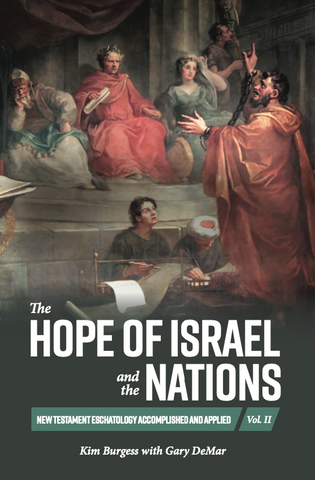Important Note: Gary DeMar’s Facebook page has been taken down. To keep up with the latest from Gary and American Vision or to continue the conversation from articles, podcasts, or videos, please go to the AV Facebook page here.
Gary responds to comments from critics on Facebook to his recent article about Acts 24:15 and the Greek word mellō.
As we have repeatedly had occasion to say in this series, contrary to these crossed wires and faulty understanding of the Bible’s covenant structure in the Westminster Assembly, these deceased OT saints had to wait long for the promised New Covenant salvation to be realized for and in them. This is precisely what the then-future resurrection of these OT people in Daniel 12:1-2 was all about as later referenced by Christ in John 5:28-29 and by Paul in Acts 24:15 where he spoke of this resurrection that was about to take place (μέλλω/mellō) in his day. It was also referenced by Paul in 2 Timothy 4:1 and by Peter in 1 Peter 4:5 in terms of the judgment that was “ready” [ἑτοίμως/ hetoimōs] and about to take place (mellō) in association with the resurrection of these OT dead in their day as the new covenantal order was fully consummated in Christ. It was then that Abraham, Isaac, and Jacob entered the New Covenant Kingdom of God, and the believing Gentiles were then gathered together with them there (Matt. 8:12; Luke 13:28-29).
But at the time that the NT, and the epistle to the Hebrews in particular, was being written, this consummate New Covenant salvation in Christ had not yet fully arrived, but it was nevertheless quite close. Go back and look at Hebrews 1:14 and 9:28. The epistle to the Hebrews couched all its message in terms of this ‘great eschatological salvation’ that was being achieved in Israel (Heb. 2:3). In Hebrews 1:14 we read, “Are they [the angels] not all ministering spirits sent out to render service for the sake of those who will inherit salvation?” But this is yet another “mellō text” that has been horribly glossed over by the English translators. It is not properly rendered as those who will inherit this salvation some nondescript day in the future, but as “those who are about to inherit salvation.” Hebrews 9 ends up in verse 28 with the same theme as to what was being waited for by these saints in that day.

The Hope of Israel and the Nations (Volume 2)
In this second and concluding volume of The Hope of Israel and the Nations, Kim Burgess continues expounding his lessons on New Testament Eschatology. With help from co-author Gary DeMar, Kim connects all the parts of the NT and fashions them into a whole. Kim emphasizes the one-and-many approach to interpretation. The parts and the whole must be studied together. They make up the warp and woof of proper biblical interpretation. The process takes time and study, but it brings the full story of the Bible into clear focus.
Buy NowGary responds to comments from critics on Facebook to his recent article about Acts 24:15 and the Greek word mellō. The point of the debate is getting somewhat lost, but Gary shows (again) that some of the original Three Questions letter signers teach the very same thing that Gary is saying about Acts 24:15 and mellō (about to be).

